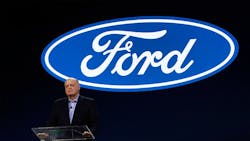Unhappy with Ford's Performance, CEO Looks to VW for Relief
Ford Motor Co.’s Jim Hackett isn’t pleased with how things are going at the automaker he took charge of a year and a half ago. To afford the costly overhaul he’s embarking on, he’s on the verge of broadening an alliance with Volkswagen AG.
“I want to tell you, I’m not happy about Ford’s performance” in 2018, Hackett said in a Bloomberg Television interview on Sunday. “I mean, that should just be said.”
Ford (IW 500/3) has started an $11 billion restructuring and earmarked a combined $15 billion in investment toward electrified and driverless cars in the coming years. The automaker is poised to announce broader cooperation with VW on Tuesday after months of talks on sharing the costs of bringing new models, battery-powered vehicles and self-driving technology to market, people familiar with the negotiations have said.
Asked why Ford may partner with VW, Hackett said the high cost of fielding competitive new models and preparing for the autonomous age requires working with rivals.
“Being able to fund both the change in the old and the new is why I’ve thought about other partners to do that,” the chief executive officer said on the eve of the main press day of the North American International Auto Show in Detroit. “We don’t have to sell Ford to do that, we don’t have to sell the brand to do that,” because competitors “can invest in like-minded technologies” with Ford.
Ford was little changed at $8.81 in Frankfurt trading from Friday's close in the U.S. The stock has declined 33% over the past year.
European Business
Hackett suggested that a competitor like VW could build Ford-branded products in Europe, where the automaker announced a sweeping restructuring last week that could include thousands of job cuts. The two companies already have said they’ll explore jointly developing a range of commercial vehicles, one of the strongest segments of Ford’s business in Europe.
“You’re going to have to rely on cooperating with some competitors” in Europe, Hackett said. “That’s how you get the underlying scale to produce vehicles at margins that are acceptable.”
One of the first joint projects may involve VW’s Amarok pickup truck.
Ford has been plagued by losses in Europe for decades, Hackett said. And the region will account for what he called “a substantial part” of its $11 billion global restructuring. Some automakers already were struggling to make money in the region before fallout from the U.K.’s vote to leave the European Union made matters worse -- a challenge highlighted on Monday when parts supplier Continental AG blamed Brexit, along with trade wars, a slowing Chinese market, and emissions testing in Europe for a gloomy forecast.
“As it relates to Europe, this is not just a new problem,” Hackett said. “We think there’s a design in the future that allows us to be there with Ford-branded products. But we have to get the industrial system in the right construct for that. I’m not going to pull any punches -- Brexit hurt.”
Not Leaving
Hackett said Ford never considered leaving Europe as General Motors Co. did in 2017, when it sold its Opel and Vauxhall units there to France’s PSA Group.
“We would never sell the Ford brand,” Hackett said. “That’s why the option of leaving Europe was never on the table.”
In the U.S., Hackett said Ford is managing to exit the sedan business without closing any factories, drawing a contrast with GM, which last month said it plans to cut off five plants in North America from new product, virtually ensuring they’ll be shut.
“You never heard of any plant closings coming from Ford,” Hackett said. “We are the highest in the industry for producing vehicles for America in America. And our blue-collar workers are in really good shape right now with the plants that we have.”
By Keith Naughton and David Westin
About the Author
Bloomberg
Licensed content from Bloomberg, copyright 2016.
